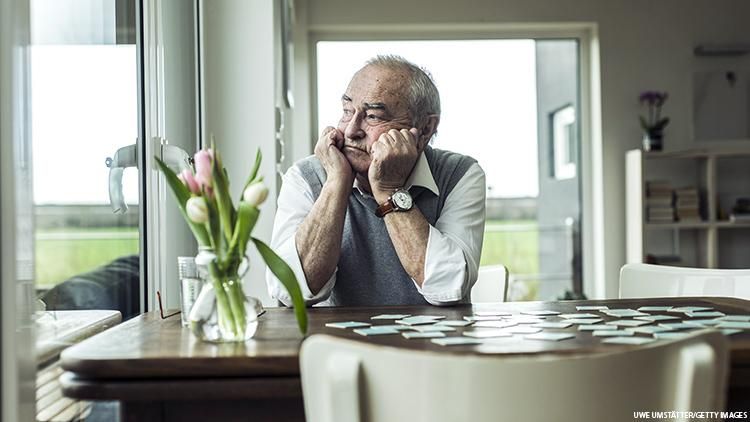Providing Help & Hope to LGBTQ+ Elders Struggling With Suicide
Author: John Casey

This is National Suicide Prevention Week, which technically means that during this week we are to raise awareness for suicide prevention. Next week is, among other things, National Child Passenger Safety Awareness Week, and the last week in September is International Deaf Awareness Week.
Since I’m partially deaf, that week means something to me, but by the time we get to the week of October 9 and National Fire Prevention Week, will anyone remember the awareness raised a month before for suicide prevention?
We’ve filled so many weeks up in the calendar that we skip from one issue to another to another and to yet another, and we forget about what we were supposed to remember from the previous month. It mimics our short attention spans. We go from one shiny object to the next without much thought for the previous one.
I guess what’s discomfiting in a way about these weeks-of is that we just pass right by something as deadly serious as suicide, which is a perfect metaphor for suicide. It’s brushed off by those who hear about one with a flippant comment like “Oh, how horrible.” Or buried deep by those who contemplate it: “I don’t have anyone to talk to about the way I feel.”
Many people don’t like to talk about suicide, because in most of our minds it’s so selfish and gruesome. When I wrote a column last December about my experiences with suicide, I heard from many readers, some who said, “I can’t believe you were so open about it. That takes bravery.”
The truth is that talking about it is less bravery and more catharsis. I spent an inordinate amount of time on that column, trying very hard to make sure that people understood that suicide is not about being selfish or gruesome. It’s more about just disappearing because staying alive is just too gruesome. Is it selfish? Perhaps, but someone who tries to die by suicide isn’t thinking about “me, me, me.” They are thinking about getting rid of “me,” because “me” just doesn’t fit in, and continuing to be “me” isn’t an option.
We too often talk about the tragedy of youths and suicide, most notably those that are LGBTQ+. And rightly so, because lost youth, particularly for young peple who can’t be themselves, is an enormous loss for the future. Youth is about hope for the future, and when one of those lights goes out, our future looks a little dimmer.
And we don’t spend enough time talking about suicide among older adults, more pointedly, LGBTQ+ elder suicide. When I wrote my column, I mostly heard from older adults, and each of them talked about being lonely, depressed, and isolated. I also heard about not fitting into a community that values youth and appearance.
Related: How to Help Prevent Suicide Among LGBTQ+ Youth
While we all agree that that isn’t right, there’s no way to dismiss our obsessions with being young and pretty. Instead of marveling at those who have weathered the tropical storm of life, we avoid looking at their hunched gaits, gray hairs, and wrinkles because, well, we don’t want those attributes. The bottom line, we don’t want to get old. If it’s not in front of us, then we don’t have to think about it. So we don’t think enough about our elders — at their peril.
I reached out to Sherrill Wayland (who uses she/they pronouns), who is director of special initiatives for SAGE, America’s oldest and largest nonprofit organization dedicated to improving the lives of lesbian, gay, bisexual, and transgender older adults. We discussed efforts to help prevent LGBTQ+ elders’ suicides by helping to combat social isolation, depression, anxiety — and substance abuse that so often helps trigger suicidal thoughts.
I asked Wayland how prevalent the problem of suicide is among older LGBTQ+ adults. “It’s estimated that 39 percent have had suicidal thoughts, and among older transgender adults over 65, they have an even greater risk of suicidal ideation and depression compared to their cisgender peers. Our research shows that two out of every five have tried, which is alarming,” she said.
Overall, Wayland said that LGBTQ+ elders over 65 have higher levels of depression, anxiety, and substance abuse and suicide compared to their cisgender peers, but that until recently, we’ve only begun to seriously address the issues. “For me personally, I live in St. Louis, and 15 years ago, all we heard about was the problem of suicide among LGBTQ youth, and it was barely mentioned for older adults, and it raised my concern level,” Wayland remembered.
“It’s easy to reflect on our own youth and the difficulty of coming out or inability to come out and all the struggles we went through when we were younger,” they added. “However, for so many of us it’s harder to relate to being older because we haven’t experienced being older, so we have no idea what it’s like. We’ve been raising awareness so that the concerns of the youth are the same as the concerns for the older population.”
For older adults, the number one contributing factor is social isolation, and according to Wayland, 59 percent of LGBTQ+ elders over 65 said they lacked companionship, and 53 percent said they felt isolated from others. Further, they are twice as likely to be single and live alone. “They often feel as if there’s no one to turn to for support,” Wayland said.
“And we often forget that some older adults still hide their sexuality because they are afraid they might lose their benefits like affordable housing or risk employment discrimination, so hiding their identities is another major problem, particularly if it’s a person of color, which only increases the level of stigma they feel, and their fear of not getting the help and services they need.”
In 2019, SAGE partnered with United Way Worldwide on a hotline that provides 24/7 support in 180 languages.
“The program provides an LGBTQ+ elder looking for help with a friendly responder who is able to listen to the feelings and concerns that the individuals express,” Wayland explained. “Prior to COVID, we were receiving approximately 30-40 calls a month, and now we get over 300 calls monthly. In some ways the increase is heartbreaking and in other ways heartening since perhaps more people are realizing that they have a place to call and are receiving the resources they need during a very challenging time.”
The SAGE National LGBTQ+ Elder Hotline can be accessed by calling 877-360-LGBT(5428).
While the hotline is a great resource, I wondered what any of us could do to help? Wayland said that the main thing we can do is to simply be there for others. “If you recognize someone in your circle of friends who might be struggling, pick up the phone and call them. Invite them to lunch, check in with them, and don’t be afraid to let them know there are programs and people to help them. We really need to be there for each other, especially as we begin to age. And if you’re younger, take the opportunity to reach out to LGBTQ+ seniors.”
Along those lines, SAGE started a program called SAGE Connect which is a phone buddy program, with volunteers who do weekly phone calls with elders. “The program is intergenerational and is a great way to make a friend and stay connected,” Wayland said. “At its heart SAGE is a community of caring activists, who come together as a community to provide hope to one another. And hope is so critical to living life.”
As I wrote in December, “Some of us live in communities or circumstances or environments that don’t allow us to be who we really are and don’t give us the opportunity to live the way we were meant to live. And what’s really sad is that so many contemplate suicide as an escape rather than a real escape that would let hope shine through.”
John Casey is editor at large at The Advocate.
If you are having thoughts of suicide or are concerned that someone you know may be, resources are available to help. The 988 Suicide & Crisis Lifeline at 988 is for people of all ages and identities. Trans Lifeline, designed for transgender or gender-nonconforming people, can be reached at (877) 565-8860. The lifeline also provides resources to help with other crises, such as domestic violence situations. The Trevor Project Lifeline, for LGBTQ+ youth (ages 24 and younger), can be reached at (866) 488-7386. Users can also access chat services at TheTrevorProject.org/Help or text START to 678678.
Views expressed in The Advocate’s opinion articles are those of the writers and do not necessarily represent the views of The Advocate or our parent company, Equal Pride.
Original Article on The Advocate
Author: John Casey




